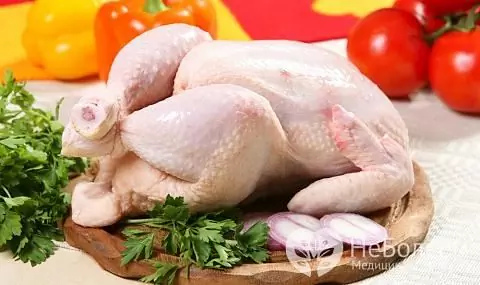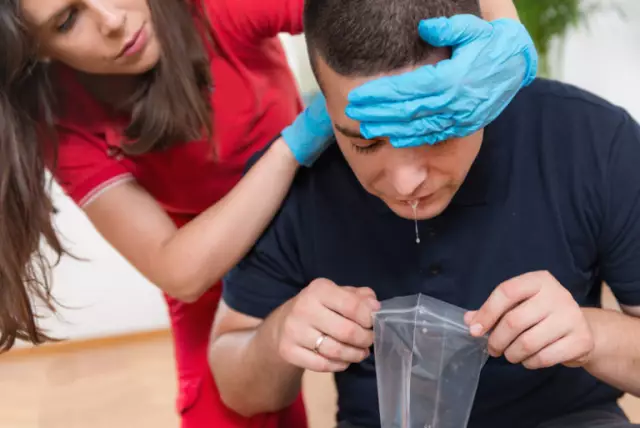- Author Rachel Wainwright wainwright@abchealthonline.com.
- Public 2023-12-15 07:39.
- Last modified 2025-11-02 20:14.
Chicken poisoning
People in all countries of the world love chicken meat. It is delicious, nutritious, and easily digestible. Due to its low fat content, nutritionists recommend including it in the diet of people suffering from obesity, cardiovascular and gastrointestinal diseases.
However, chicken meat can be not only useful, they are often poisoned.

Source: depositphotos.com
How does chicken poisoning occur?
A violation of the cooking process of chicken meat or improper storage of ready-made dishes from it leads to chicken poisoning. Chicken meat is an excellent breeding ground for many pathogenic and opportunistic microorganisms, and therefore even a slight violation of sanitary and hygienic standards during its production and processing can cause food poisoning.
When eating chicken meat that has not undergone a full-fledged heat treatment, you can become infected with salmonellosis, since chickens are frequent carriers of Salmonella. In a thicker piece of meat, Salmonella can survive by boiling for several minutes.
Another cause of chicken poisoning is infection of meat with staphylococcus. Unlike Salmonella Staphylococcus dies quickly even at 80 on C, but they produced enterotoxin is maintained even after prolonged boiling.
Other bacteria, such as Escherichia coli, Shigella, and streptococci, can also cause chicken poisoning.
Getting along with low-quality meat into the stomach and small intestine, pathogenic microorganisms secrete enterotoxin in the process of their vital activity. This substance triggers an inflammatory process in the mucous membranes of the gastrointestinal tract, which interferes with the absorption of nutrients and water. As a result, gastroenteric syndrome develops. Enterotoxin also enters the general bloodstream, leading to the appearance of symptoms of general intoxication.
In pursuit of profit, unscrupulous producers feed chickens with special substances that contribute to their rapid growth and weight gain. These additives are approved for use in veterinary practice, but they can cause allergic reactions and poisoning in humans, although this is not common.
Poisoning symptoms
The incubation (latent) period for chicken poisoning is short, from the moment of eating poor-quality meat and the appearance of the first signs of the disease, it usually takes 1 to 4 hours. The disease begins with a feeling of heaviness in the stomach, belching and nausea. After some time, other signs of poisoning are added to these symptoms:
- frequent loose stools. The feces are often offensive and frothy;
- cramping abdominal pain. After defecation, its intensity decreases for a while;
- vomiting;
- increased body temperature;
- headaches and muscle pains;
- weakness, lethargy;
- lack of appetite.
With severe diarrhea, the human body quickly loses fluid, dehydration develops. Its symptoms:
- dry skin and mucous membranes;
- increased feeling of thirst;
- low blood pressure;
- tachycardia;
- dark saturated color of urine;
- decreased urine output (decreased urine output).

Source: depositphotos.com
First aid for poisoning
First aid for chicken poisoning is aimed at the speedy removal of a poor-quality product from the digestive tract, and the elimination of toxic substances from the body.
First of all, the patient needs to wash out the stomach. To do this, he is given a few glasses of salted water or a pale pink solution of potassium permanganate to drink. Then they induce vomiting by irritating the root of the tongue with the fingers or the handle of a spoon. It is advisable to repeat this procedure several times, which will make it possible to completely cleanse the stomach of microbes and the enterotoxin they produce. Attention! Do not wash the stomach in this way for children and people in an unconscious state!
In order to bind toxic substances that have entered the gastrointestinal tract and naturally remove them outside, the patient should be given a suspension of activated carbon. To prepare it, you need to crush tablets into a fine powder and mix it with a small amount of boiled water. For every 10 kg of the patient's body weight, it is necessary to take 1 tablet of activated carbon.
To reduce the manifestations of intoxication and prevent dehydration, the patient should drink more fluids (oral rehydration). It can be mineral water without gas, unsweetened and weak tea, but it is best to use Rehydron solution. The liquid should be drunk in small sips, otherwise you can cause increased nausea and provoke vomiting.
When is medical attention required?
Medical attention should be sought immediately in the following cases:
- signs of poisoning persist for more than two days;
- poisoning happened in an elderly person, child or pregnant woman;
- signs of dehydration have appeared and are growing.
After the examination, the doctor may prescribe a bacteriological study of feces and vomit, which allows to identify the causative agent of the disease and determine its sensitivity to antibiotics.
Medical treatment for chicken poisoning usually includes antibiotics and detoxification therapy. In case of violations of the water-electrolyte balance, they are corrected by intravenous infusion of saline solutions. The appointment of enzyme preparations and vitamins is also shown.
Possible consequences
Subject to timely first aid provided to the patient, signs of chicken poisoning usually disappear within two days.
During the recovery period, many patients note stool instability. This is due to the inflammatory process occurring in the intestinal mucosa. Within a week, the inflammation subsides and the stool becomes regular and regular. The treatment of such a complication consists in the correct organization of medical nutrition - the patient is shown a dietary table No. 4 according to Pevzner.
A much more serious complication is dehydration. Against its background, serious changes occur in the activity of almost all body systems. Dehydration is especially dangerous for young children, as it can lead to the development of hypovolemic shock and cause the formation of acute renal failure.
Prevention
It is much easier to prevent chicken poisoning than to treat its consequences. In order for the use of chicken dishes to bring only benefits and pleasure, the following rules should be observed:
- buying chicken in stores;
- before starting cooking, the bird should be thoroughly rinsed under running water;
- heat treatment for a sufficient time so that there are no traces of blood on the cut of the piece of meat;
- store ready-made chicken dishes only in the refrigerator in a sealed container, the shelf life should not exceed 48 hours.
YouTube video related to the article:

Elena Minkina Doctor anesthesiologist-resuscitator About the author
Education: graduated from the Tashkent State Medical Institute, specializing in general medicine in 1991. Repeatedly passed refresher courses.
Work experience: anesthesiologist-resuscitator of the city maternity complex, resuscitator of the hemodialysis department.
The information is generalized and provided for informational purposes only. At the first sign of illness, see your doctor. Self-medication is hazardous to health!






